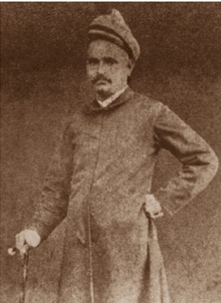Sakharam Arjun on:
[Wikipedia]
[Google]
[Amazon]
 Sakharam Arjun (sometimes Sakharam Arjun Ravut in official documents but he did not use the
Sakharam Arjun (sometimes Sakharam Arjun Ravut in official documents but he did not use the
 Arjun was born in Mumbai and lost both his parents by 1850. Arjun studied at Elphinstone Institution and joined
Arjun was born in Mumbai and lost both his parents by 1850. Arjun studied at Elphinstone Institution and joined AIR 1988 Bom 321, 1988 - Vaman Ganpatrao Trilokekar and others vs Malati Ramchandra Raut And others on 18 November 1987 - Bombay High Court
/ref>
Sakharam Arjun 1879 Catalogue of the Bombay drugs: including a list of the medicinal plants of Bombay used in the fresh state.
Life sketch
19th-century Indian medical doctors 1839 births 1885 deaths Medical doctors from Mumbai Members of the Bombay Natural History Society {{India-med-bio-stub
 Sakharam Arjun (sometimes Sakharam Arjun Ravut in official documents but he did not use the
Sakharam Arjun (sometimes Sakharam Arjun Ravut in official documents but he did not use the caste
Caste is a form of social stratification characterised by endogamy, hereditary transmission of a style of life which often includes an occupation, ritual status in a hierarchy, and customary social interaction and exclusion based on cultural ...
-linked surname in publications) (1839-16 April 1885) was an eminent physician and social activist in Bombay. An expert on Indian medicinal plants, he was one of the two Indian founding members of the Bombay Natural History Society
The Bombay Natural History Society (BNHS), founded on 15 September 1883, is one of the largest non-governmental organisations in India engaged in conservation and biodiversity research. It supports many research efforts through grants and pub ...
. He became the step-father of the pioneering woman physician Rukhmabai
Rukhmabai (22 November 1864 – 25 September 1955) was an Indian physician and feminist. She is best known for being one of the first practicing women doctors in colonial India as well as being involved in a landmark legal case involving her ...
(1864-1955) after he married her widowed mother Jayantibai. He also wrote books in Marathi.Biography
 Arjun was born in Mumbai and lost both his parents by 1850. Arjun studied at Elphinstone Institution and joined
Arjun was born in Mumbai and lost both his parents by 1850. Arjun studied at Elphinstone Institution and joined Grant Medical College
The Grant Government Medical College, Mumbai, is a public medical college, affiliated to the Maharashtra University of Health Sciences. Founded in 1845, it is one of the oldest institutions teaching medicine in South Asia.
Its clinical affi ...
as a Stipendiary Student in 1858. His tutor was Narayan Daji, brother of Bhau Daji. Arjun received a Licentiate of Medicine from the Bombay University in 1863. He joined to teach medical botany and was made an assistant, the first Indian in the position, to William Guyer Hunter. He worked at the Jamsetjee Jeejeebhoy Hospital and was for sometime in charge of the ward for incurables. He conducted experiments on the therapeutic value of oils like chaulmoogra and cashew nut in the treatment of leprosy. He was later appointed Assistant Surgeon. Sakharam was interested in public education on health and published ''Vaidyatatva'' (1869), ''Garbhavidya va Prasutikaran'' (1873), ''Vivahavidnyan'' (1877) among others. He also subscribed to ''The Theosophist'' writing a note on ''Physiology of Marriage'' in 1880.(p. 186) Sakharam Arjun married Jayantibai, the widow of Janardhan Pandurang, and supported his step-daughter Rukhmabai who was married as a child and refused to go to live with her husband. This led to a landmark court case and Rukhmabai later went to study medicine in London (with the assistance of others like Edith Pechey Phipson
Mary Edith Pechey (7 October 1845 – 14 April 1908) was one of the first women doctors in the United Kingdom and a campaigner for women's rights. She spent more than 20 years in India as a senior doctor at a women's hospital and was involved ...
) to become one of the first Indian women doctors. In 1883, Sakharam Arjun was one of two Indian founding members (the other being Atmaram Pandurang
Atmaram Pandurang or Atmaram Pandurang Turkhadekar (or just Turkhad in English publications) (1823 – 26 April 1898) was an Indian physician and social reformer who founded the Prarthana Samaj and was one of the two Indian co-founders (the other ...
) of the Bombay Natural History Society
The Bombay Natural History Society (BNHS), founded on 15 September 1883, is one of the largest non-governmental organisations in India engaged in conservation and biodiversity research. It supports many research efforts through grants and pub ...
. Arjun had been one of the presidents of the Bombay Medical Union. Sakharam Arjun died before the Rakhmabai case came to an end. He died on 16 April 1885 leaving Jayantibai (died 10 January 1904) and three sons from his first marriage, Vasantrao, Yeshwantrao and Raghunathrao./ref>
References
External links
Sakharam Arjun 1879 Catalogue of the Bombay drugs: including a list of the medicinal plants of Bombay used in the fresh state.
Life sketch
19th-century Indian medical doctors 1839 births 1885 deaths Medical doctors from Mumbai Members of the Bombay Natural History Society {{India-med-bio-stub